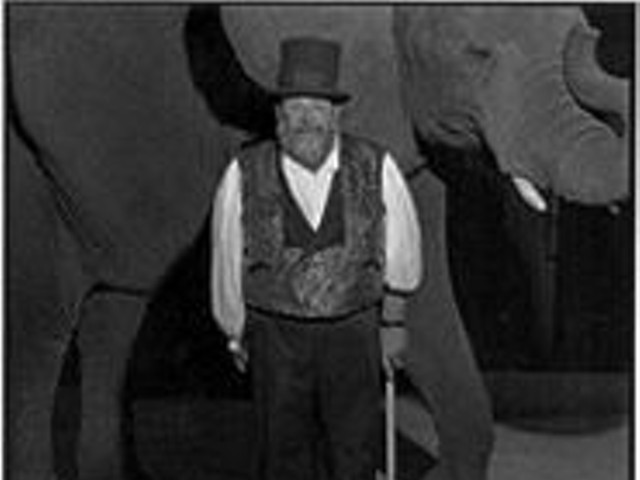The News-Telegraph, a twice-monthly free newspaper geared to the gay and lesbian community and circulated in St. Louis and Kansas City, published its last edition on Jan. 14. Founder and editor Jim Thomas points to a variety of causes in his postmortem, with several of the reasons being the harmful side effects of otherwise good or indifferent developments. Declining ad revenues translated into operating deficits that ultimately forced the paper out of business. One such area was a decline in personal ads: The growing tolerance for those ads meant that publications with larger circulations ended up running their own.
"When that business came into being, the ads were considered unacceptable, and gay papers were one of the few places that would accept them," says Thomas, who had been editor of the paper since it was started in 1981. "Now everyone has phone personals."
Better survival rates for people with HIV meant fewer ads from viatical companies, which buy life-insurance policies from terminally ill patients in need of cash. In this regard, a positive development translated into a financial hit to the News-Telegraph. "The logical replacement for those ads is the pharmaceutical companies that sell the drugs that allow people to survive. For a variety of reasons, those companies have stuck to the top 10 markets in the country and don't really go into middle- and small-sized papers like ours," Thomas says.
The final event that did the paper in was when Mulryan/Nash, an advertising firm in New York City specializing in gay and lesbian media, went out of business. "They went belly-up in December and left us holding the bag on thousands of dollars," says Thomas. "It was more than we could bear."
The lack of an audited circulation was an disincentive for large ad firms to place national ads in the News-Telegraph, which had an estimated circulation of 14,000. But the paper's budget limited Thomas. "The reality is, for a paper in a market our size, we can't afford to have our circulation audited and pay out $10,000 a year to do all this stuff," he says. "That's not realistic. "
Thomas, a 42-year-old Alton native who plays viola in the St. Louis Philharmonic, did some prospecting for investors before the last issue but came up dry. Since he closed the paper, two people have approached him about reviving it, but it's too early to know how serious those inquiries are.
Thomas and the paper's four other employees aren't the only casualties of closings in the gay press. Newspapers in Minneapolis, San Jose and Long Beach also have folded recently.
WHEN IT COMES TO BRADLEY, HOW MANY WILL WANT TO BE LIKE MIKE? Policy papers by a presidential candidate, whether the candidate ends up winning or losing, likely will end up in the paper shredder. Or, in the case of Bill Bradley, maybe they'll go into the recycling bin. When Bradley showed up Feb. 9 at University City High School to share his plans for education, the media dutifully took notes and kept the cameras and tape recorders rolling. But paying close attention just made a spectator realize how lofty and idealistic it all was -- and, considering the setting, how difficult the execution of his ideas would be.
One of Bradley's three main points in his education speech was that parents who have children in dysfunctional schools should have the opportunity to transfer their children to better schools. Makes sense. But Bradley made those comments in a school district, University City, that in 1996 refused to accept students from neighboring Wellston when that district's schools lost their state accreditation ("Short Cuts," RFT, Aug. 11). Section 167.131 of the Missouri Revised Statutes states that unaccredited districts must pay transportation and other costs if a student attends a neighboring district, but state law doesn't make clear whether the other district is required to accept the transferring student. In this case, University City said no to the request by Wellston students, and no legal appeal was made. It's one thing for a president to say what ought to be, but how do you make school districts, or states, do what they don't want?
But whatever pitfalls his policy sermon may face in the real world, Crystal City native Bradley is head and shoulders above, both literally and figuratively, Al Gore. The St. Albans-Harvard graduate wore cowboy boots when he schmoozed with Jay Leno on Feb. 10, responding to a giddy Leno query about his running against Bradley by saying this: "The winds of competition have filled my sails and put my keel deeper in the water." What the hell did that mean? Is it a vague sexual reference, and if it is, what part of Gore's anatomy is his keel? Maybe it's better this isn't discussed in public. Tipper might advise parental discretion when talking about her husband's Tonight Show comments.
In contrast, Bradley may come off a tad dry and sardonic, but at least he seems to be thinking and to have a sense of ethics. Don't think he'd be one to criminalize any Buddhist nuns, controlling legal authority or no. After addressing the crowd of students and citizens at U. City High, Bradley held a press briefing, which he ended by reciting the opening chorus of Chuck Berry's "Johnny B. Goode" and imitating, briefly, Berry's duck walk. Perhaps this was Bradley's answer to Alan Keyes' dive into the mosh pit.
Later, in the Duck Room, in the basement of Blueberry Hill, Bradley cajoled 100 or so college-student types who were invited by e-mail from www.billbradley.com. He told them not to be lulled by the current prosperity but to "fix your roof while the sun is shining." Bradley kept asking them, "What is your dream?" At one point, from the side of the room, Chuck Berry his ownself yelled out, "Bradley as president!"
Bradley got endorsements from two supporters of varying basketball abilities, Missouri Attorney General Jay Nixon and former Chicago Bull Michael Jordan. Nixon attended Bradley's education speech, sitting in the front row. Jordan, the world's premier salesman and most recognizable figure, once said he didn't dabble in politics because "Republicans buy shoes, too." Jordan changed his mind for Bradley, and his 30-second spot is airing nationally.
At Blueberry Hill, Washington University senior Steve Zimmerman typified the upbeat crowd. Zimmerman, a chemical- and biomedical-engineering major, says he plans to work in engineering for a couple of years and then "work toward ending poverty in America." Zimmerman thinks this can be done through "social entrepreneurism." Let's hope so. Wonder whether there's a policy paper on that. Send it to Wellston.
FLOTSAM AND JETSAM: There was a time when a local politician running for mayor would have loved to have his photo snapped with a twice-elected president from the same party. But that was before Bill Clinton did for oral sex what Ronald Reagan did for the benefits of trickle-down economics -- made a lot of people talk about it without getting any themselves. So when St. Louis Aldermanic President Francis Slay was invited, along with city officials from Nashville, to watch the Super Bowl with Clinton, he jumped at the chance. Got his photo taken with Clinton, too, but he admits he may not use it in his upcoming challenge of Mayor Clarence Harmon, saying it wouldn't mean much either way. Slay kids that he may instead use the photo he had taken with Lynda Carter, television's Wonder Woman.
Give us your feedback by e-mailing [email protected], faxing 314-615-6716 or calling 314-615-6711.


